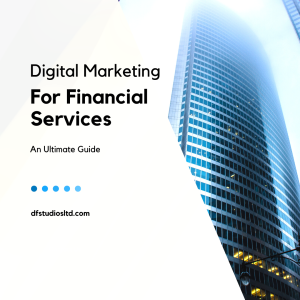It’s no secret that financial institutions are under a lot of pressure these days. Consumers are more cautious with their money, and regulations are tighter than ever. So how can you make sure your financial institution stands out from the crowd?
One way is to focus on your content. In a world where consumers are bombarded with marketing messages, your content needs to be sharp, on-point, and relevant.
That’s where copywriting comes in. Copywriting is the art of crafting persuasive, attention-grabbing content that speaks to your audience’s needs. And with financial institutions, you must opt for financial copywriting services.
This article will discuss financial copywriting and what a financial copywriter does. We’ll also provide some tips on how to get started.
What Is Copywriting for Financial Institutions?
Imagine a world where you could reach your desired audience with the perfect message at just the right time. Financial copywriting is one of those rare fields.
It has many niches for marketers to specialize in – from cryptocurrencies to investment opportunities or retirement finance, throughout different target groups who may want their ads targeted accordingly to get the best results.
Financial copywriting is a type of specialized writing that focuses on creating content for financial institutions, such as banks, insurance companies, and investment firms. This type of writing must be clear, concise, and persuasive in order to achieve its purpose: to convince the reader to take action, whether that’s opening a new bank account, investing in a new stock, or purchasing insurance.

What Does a Financial Copywriter Do?
A financial copywriter is a specialist who writes content for financial institutions. This includes website copy, blog posts, email marketing campaigns, social media posts, and more. Financial copywriters must have a deep understanding of the financial industry, as well as the needs and concerns of consumers. They use this knowledge to create content that is both informative and persuasive.
Financial copywriters must be able to write clearly and concisely and understand the complex financial concepts they are writing about. They must also be able to effectively target their audience and craft messages that meet their needs.
Besides writing new content, a financial copywriter is also responsible for editing and proofreading existing content. They may also be involved in the strategy and planning of new content campaigns.
Overall, they create accurate and persuasive content. Their goal is to help their clients achieve their business goals, whether by increasing brand awareness, generating leads, or making sales.
6 Financial Copywriting Tips
With the ever-changing financial industry landscape, it’s tough to keep up with the latest trends and developments. But if you want your content to be relevant and persuasive, you need to stay on top of the latest news. Here are six tips to help you do just that:
1. Based on Your Expertise, Find a Niche
Since finance is a broad topic, it’s important to specialize in a specific area. This will help you become an expert in your field and allow you to create relevant and useful content for your audience.
Some niches include:
- Investing
- Retirement planning
- Personal Finance
- Budgeting
- Debt management
- Taxes
- Insurance
Choose a niche that you’re passionate about, as well as one that you have experience in. This will make it easier for you to write about complex topics in a way that is easy for your audience to understand.
2. Tell Customers What They Want to Hear
Your customers want to know how your product or service can benefit them. They don’t want to be bombarded with financial jargon or sales pitches. Keep your messages clear and to the point. Tell them what they need to know and leave out the rest.
For example, if you’re writing about a new investment opportunity, don’t try to sell them on the idea with complicated financial lingo. Instead, focus on how this investment can help them reach their financial goals.
3. Numbers and Data Must Close to the Exact Figures
We round up or down when we mention numbers or data to support our claims. But with financing, precision is key. Your audience will lose trust in you if they feel you’re padding your numbers. So always use exact figures and data to support your claims.
This doesn’t mean that you should include every single number in your content. But you should include enough data to back up your claims and give your audience the information they need to make an informed decision.
For example, in a sales pitch, you might say, “our company has helped thousands of people save money on their taxes.” But if you’re writing an article about tax-saving strategies, include the exact percentage or dollar amount people can save.
It’ll take some time to use exact numbers and data. But once you get the hang of it, it’ll become second nature.
4. Don’t Be Afraid to Boast about What You’ve Accomplished
In the world of finance, confidence is key. If you don’t believe in your product or service, why should your audience?
It’s important to toot your own horn from time to time. But you don’t want to come across as arrogant or pushy. So it’s important to strike a balance.
For example, let’s say you’re writing a case study about a recent successful project. Instead of saying, “we did a great job,” try something like, “our team’s hard work paid off, and we could achieve amazing results for our client.”
This keeps you from sounding like you’re bragging while still showing off your company’s successes.
5. Customers Should Be Informed of Your Jargon
The financial industry is full of jargon and acronyms. And if you’re not careful, this can make your content difficult for the average reader to understand.
Whenever you use industry-specific lingo, take the time to explain what it means. This will ensure that your audience is always up-to-date on the latest industry trends.
Never use jargon just for the sake of using it. Only use it when it’s absolutely necessary. Your goal should be to make your content as easily understood as possible.
6. Use Stories and Anecdotes
People love stories. And when used correctly, they can be a powerful tool for marketing your financial products and services.
Stories humanize your brand and make it easier for your audience to connect with you. They also help to paint a picture of what your product or service can do for your customer.
7. Copy in a Logical Order
The order of your copy is just as important as the copy itself. You want to make sure that your content is easy to follow and makes sense.
Think about the order of your copy before you write. What information do you want to include, and in what order should it be presented?
For example, let’s say you’re writing a blog post about the different retirement accounts. You might start with a general overview of each type of account. And then you can go into more detail about the benefits of each one.
This helps to ensure that your readers will understand and absorb the information in your content.
What to Look For in a Financial Copywriter?
Financial copywriting can make or break your thousands of dollar ad campaign. Therefore, you must be very careful when choosing a copywriter for your financial institution. Here are some things to look for:
1. Finance Industry Experience & Credentials
Isn’t it obvious? You want someone who knows the ins and outs of the financial industry. They should have a firm understanding of the products and services you offer. And they should be able to write copy that resonates with your target audience.
The best way to find a financial copywriter with industry experience is to look for someone who has previously worked with similar financial companies. For example, if you’re a bank, look for a copywriter who has experience working with other banks.
2. Understand Your Unique Value Proposition
Everyone’s got something special to offer. And your financial institution is no different.
Your unique value proposition sets you apart from your competitors. It’s what makes your company special.
You need to make sure that your copywriter understands your unique value proposition. They should be able to capture the essence of what makes your company different and use it in your marketing materials.
The ability to capture your unique value proposition separates good financial copywriters from great ones.
Please note that this is a made-up example; you should not use this in your own copy.
3. Have a Successful Track Record
You want to make sure that the financial copywriter you choose has a successful track record. Ask to see samples of their previous work. And if possible, try to find out if their previous clients were happy with the results.
The best way to gauge a copywriter’s success is by looking at their portfolio. This will give you a good idea of their style and the type of results they’ve achieved for their clients.
4. Testimonials and past clients
Testimonials are a great way to get an idea of what it’s like to work with a particular copywriter. And they can also give you some insight if the copywriter you are hiring can produce quality content.
When you’re looking at testimonials, pay attention to the language that’s used. Are the testimonials specific and detailed? Or are they vague and general?
The more specific and detailed the testimonials, the better.
Testimonials like, “Great copywriter! They helped me increase my sales!” are not as helpful as testimonials like, “I was able to increase my sales by x% after working with copywriter XYZ.”
5. Willing to Learn About Your Business
A good financial copywriter should learn about your business. They should take the time to understand your products and the financial services industry. And they should be interested in your company’s story.
Final Thoughts
As a financial institution, your website landing pages are critical in attracting and retaining customers. The content on your site must be well written, accurate, and persuasive in order to achieve your desired results in financial markets.
Not only does content on your website matter, but you may also need a good copywriter for other things like sales letters, newsletter’s landing page, etc.
While trying to save money by having employees write your website financial sales copy may be tempting, this is often a mistake. The truth is that professional copywriters have the skills and experience necessary to create effective and engaging financial content.
If you would like to find out how you can make the best landing page for your financial institution, DF Studios would be most willing to assist you with this in a consultation call. Contact us today and we can schedule one as soon as possible.






